Essex bird sanctuary owners tells of avian flu outbreak shock
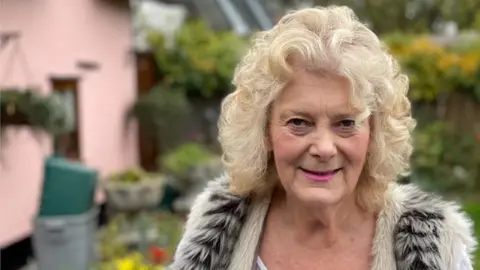 Jamie Niblock/BBC
Jamie Niblock/BBCThe owner of the wildlife sanctuary at the centre of a bird flu outbreak says she feared the worst because of how quickly it killed her animals.
The highly contagious H5N1 virus was found at the Willow Wildlife Animal Sanctuary in Kirby Cross in Essex.
Temporary control zones are in place around the affected site, preventing the movement of birds.
Sanctuary owner Julie Menzies says she and her team are devastated by the outbreak.
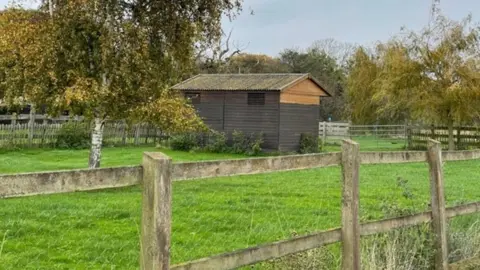 Jamie Niblock/BBC
Jamie Niblock/BBCThe virus killed 10 guinea fowl and 13 chickens, says Ms Menzies.
The first sign of a problem emerged when Ms Menzies returned from a four-day break on 5 November and two of the chickens were recorded in the sanctuary's book as having died.
"I went to bury them and noticed they were perfect little creatures and that seemed really rather odd," she says. "It went from there really.
"The geese started to get affected - they could not get up and they seemed drunk. Their deaths took a little longer, about a day and a half. The chickens just fell over and died.
"It has been devastating for us and all our volunteers are heartbroken. It is very, very sad.
"They did tell me it was H5N1, but I already knew it must be [that] because it was so infectious," she says.
"So many animals were infected - 23 animals dying in one day? We never have that - the odd chicken dying maybe if it is old, but never that many.
"And they all appeared very healthy before they died. It was a very rapid thing."
Her 12 remaining birds, which includes geese, chickens and guinea fowl, will now be culled.
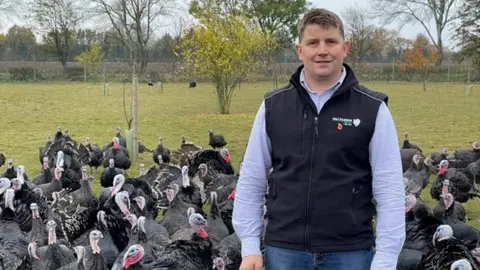 Jamie Niblock/BBC
Jamie Niblock/BBCIn the run up to Christmas, a bird flu outbreak is the last thing poultry farmers want to see.
Some 25 miles (40km) away from the Kirby Cross outbreak, G and J Barron Farms, near Colchester, has 2,200 turkeys.
"We are concerned about it," says Ross Barron. "We are hopefully far enough away from the coast which is a big issue because that's where a lot of the outbreaks are.
"And we are far enough away from any reservoirs where wild birds tend to migrate to.
"We've put everything in place that we feel we need to do."
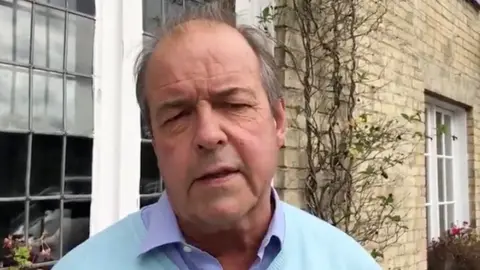
John Spence, of Essex County Council, says he hopes the disease had been "nipped in the bud".
"It is a small outbreak, sadly in a bird sanctuary," said Mr Spence, the council's cabinet member responsible for health and social care.
"This is cause not for panic or worry but for precaution. Avian flu outbreaks are not that uncommon and fortunately this one seems to have been nipped in the bud.
"The people who have most cause to be worried had letters last night and we will be taking precautions around a 3km zone which will mean you can't move birds in and out of it."
The Department for Environment, Food and Rural Affairs website says the virus is "primarily a disease of birds and the risk to the general public's health is very low".
Different government restrictions around the movement of birds apply in two control zones, one of 3km (1.8 miles), and a wider one of 10km (6.2 miles).
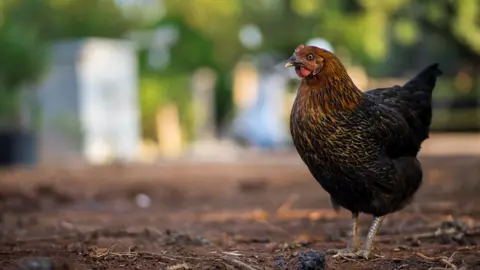 Getty Images
Getty ImagesMr Spence said 19,000 residents would be receiving letters informing them of the situation and explaining the measures being taken to prevent the virus spreading.
"The real issue is for anybody with chickens in the garden," he said.
"I understand after nearly two years of Covid this news, on top of everything else, makes people just feel weary.
"It is not on that scale, there is no evidence of spread or transmission. What we want to do really is to nip it in the bud."
Avian flu is spread by close contact with an infected bird, whether it is dead or alive.
A Defra spokeswoman said: "All birds on the premises will be humanely culled to limit risk of onward transmission."
An Avian Influenza Prevention Zone (AIPZ) has been in place across Great Britain since 3 November, after the discovery of a strain of the virus in a small poultry unit in Warwickshire.
The AIPZ means bird keepers need to follow strict biosecurity measures to help protect their flocks.

Find BBC News: East of England on Facebook, Instagram and Twitter. If you have a story suggestion email [email protected]
